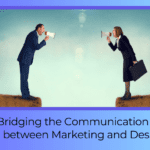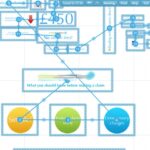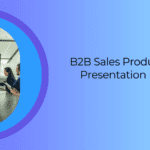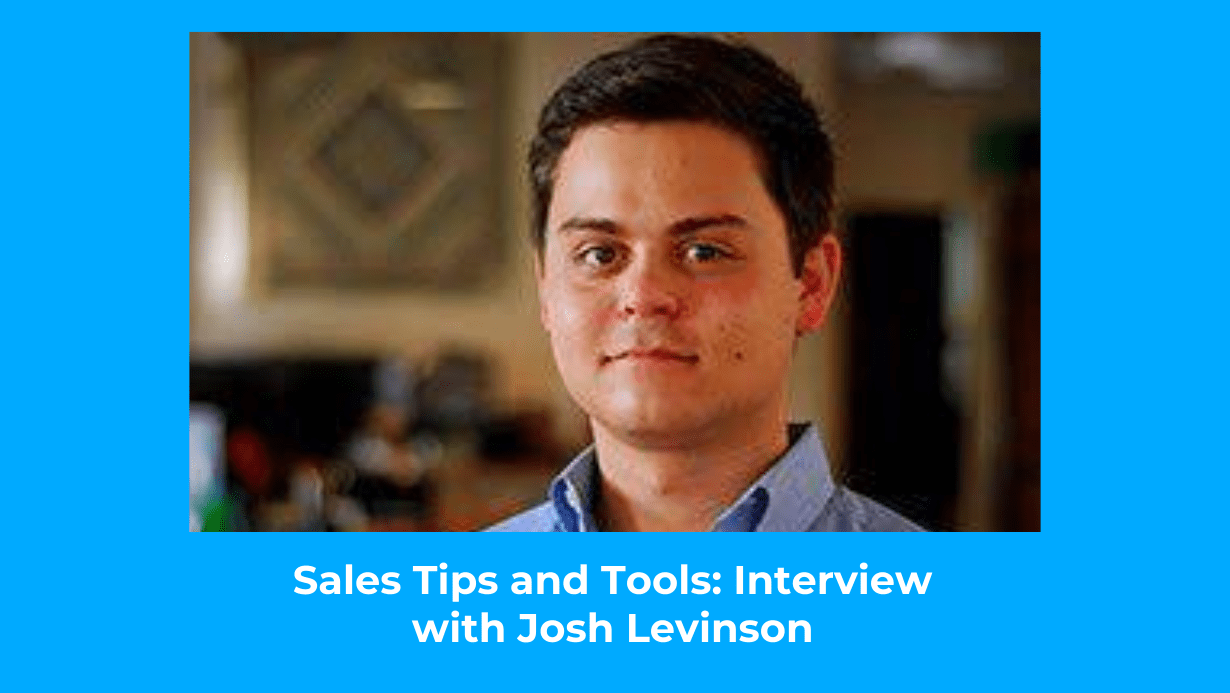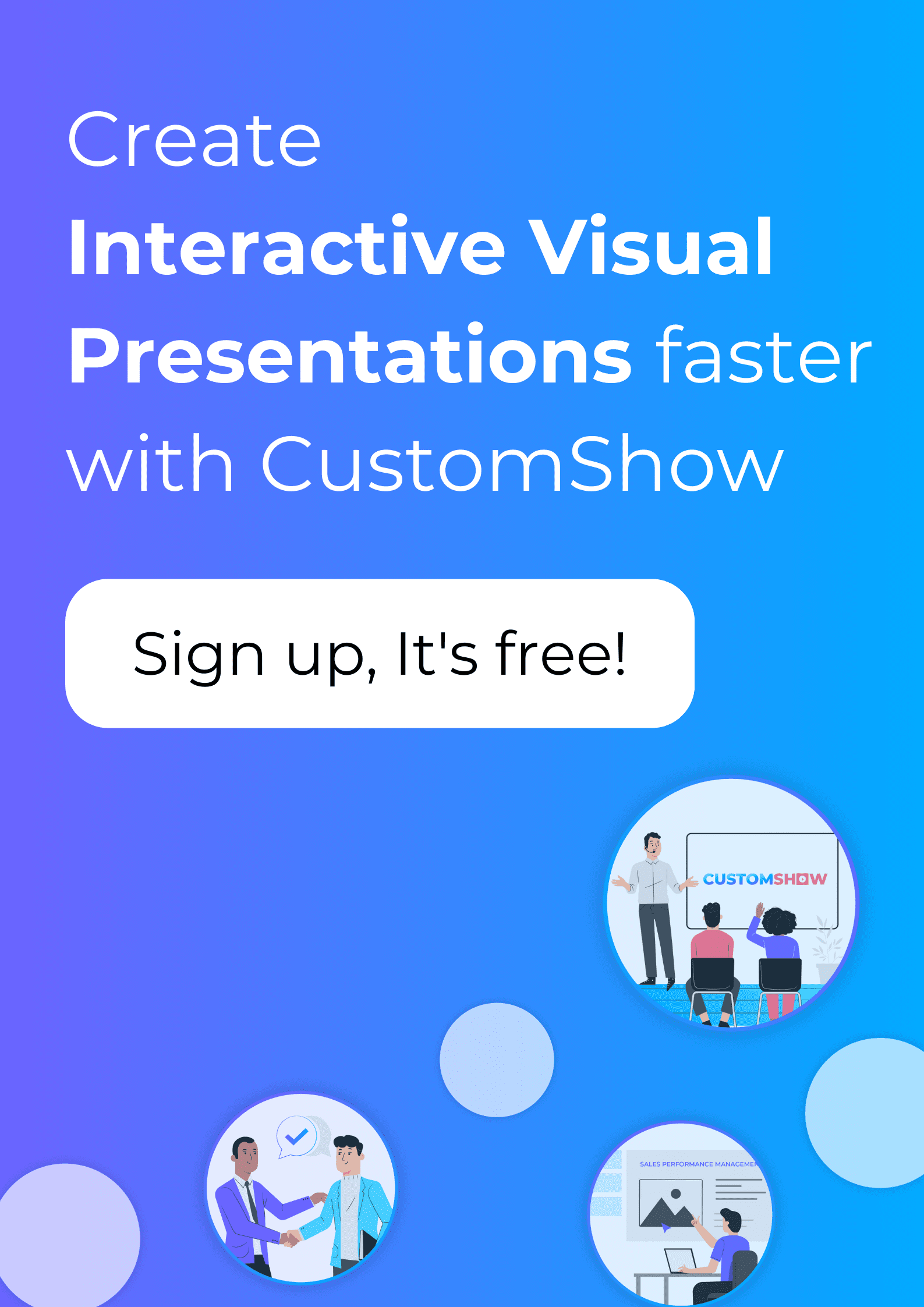I recently had the opportunity to sit down with Josh Levinson, the Head of Sales at CustomShow to talk about the sales tips and tools he uses for success. In addition to heading up sales, he also assists with marketing and product development.
Josh first started his career in sales in the executive recruiting space, specializing in placing General Counsels, Chief Compliance Officers and other senior-level legal professionals at top investment management firms and Fortune 100 corporations. He graduated Magna cum laude from Manhattanville College with a degree in Economics.
What do you love most about selling?
The thing that I love most about selling is being able to help people. I talk to people that are frustrated with the status quo, but might not know what to change or how to change it. I enjoy listening to prospects and being able to leverage my experience to help them uncover potential problem areas they might not have recognized. Being able to help them solve problems that directly relate to key business objectives is what keeps me motivated and excited about sales. I don’t necessarily think of what I do as selling but rather consulting and collaborating with people. Nothing makes me happier than a client calling or emailing to say thanks.
Do you approach each company you speak to in the same way?
No. Even within the same industry vertical, every company is different. They vary in size, have different initiatives/objectives and are each organized differently. It’s always interesting learning about them individually. The things I explore first about each company are: what they do, how they’re structured, and what are their market dynamics. I’m talking to marketing and sales people every day, so learning more about what is important to them, as opposed to making assumptions based on their competitors, lets them know you care. That said, when researching a company you should always take a look at your prospect’s competitive set as well.
Do you prefer sales calls or in-person meetings?
I ALWAYS prefer meeting in-person. It’s great to put a face to a name, shake their hand and see them in their own environment. You can really learn a lot about a company’s culture just by walking through their office.
They say 93% of communication is non-nonverbal and I truly believe it. Take, for example, when you’re discussing costs with a potential client and you can see (not just hear) their reaction. It’s much easier to gauge if your expectations are in line with theirs or not. That’s something you would have missed out on over the phone. Another example is when you’re discussing a specific feature or benefit and everyone’s eyes light up or they look to their colleague and you can see on their face “Yeah, we have that problem all the time.” It’s these non-verbal cues that you just can’t get over the phone.
Being able to leverage those cues and get a sense of whether or not it’s a good fit/opportunity will help you allocate your time and focus as you continue along in the sales process.
Another downside I’ve noticed about online meetings is how easy it is for someone on the call to surf the web, answer emails or look at their phones while you’re presenting your product/solution. Being able to grab someone’s undivided attention for 20 or 30 minutes is super difficult in this day and age but makes for a much more productive meeting. I’ll take 20 minutes in person over an hour on the phone any day!
You mentioned getting to know different customers and different kind of industries. What tools do you use the most to perform research and find prospects and decision makers?
The primary tool I use is LinkedIn which is especially effective for finding your target prospects or the buyer personas that are most likely to be the decision makers,within your employer business, I think LinkedIn is where it’s at. Also, being able to see your prospect’s past employers is super useful. If you’ve identified someone and they’re at one of your current client’s direct competitors, it’s possible they might know someone from your current client that could be an advocate for you or your product. The more information I can find, the greater chance I have for success in your employer business.
My Dad once told me “People don’t care about how much you know until they know how much you care.” I’m never going to call up some C-level exec and just start pitching him or her out of the blue. I need ammo and information. I want them to say “Wow, this guy really did his due diligence”. That came come from checking that person’s tweets, reading an article that the company just launched a new mobile app, or finding info in the latest Letter to Shareholders. It’s kind of like the difference between a mass email to hundreds of people and one that’s tailored just for you. I feel this helps establish trust and create a rapport, but it also gives you a better understanding of the person and what’s important to them.
What advice would you give to other sales executives when using LinkedIn?
Try Linkedin InMails! There are a ton of ways to figure out corporate email conventions, but you’re bound to get stumped every now and then. Using InMail is a great way to ping prospects when all other outreach attempts have failed. I’ve had a lot of success with InMail. A best practice is not to sell in the message, but keep it VERY short and sweet. Typically I’ll reach out for advice on who to contact regarding a certain job function within the organization. Most of the time there’s a pretty good chance the person I’m InMailing is the right person, but it’s a non-threatening way to start a conversation.
If that research piece and finding out more about the prospects is your first step, what do you do next when you’re approaching your new business development? Are there other tools you use?
After doing some Linkedin research, my next step is to check out the company’s website. Another really valuable tool I’ve been using to find recent information about a person or company is Google Alerts. If you put in the name of the Company or person, Google will send you all the current things they’ve posted on social media, news articles posted around the web, press releases, etc. Maybe you find out the company just filed for bankruptcy, or acquired a competitor. This info could help determine if the timing is right to be reaching out. Sometimes when I find an interesting article about a company that might tie-in to my space or product I’ll reference that in my outreach email. Something along the lines of “I just read in the WSJ that you did X,Y and Z which is why I’m reaching out”.
Twitter’s a great place too—both the prospect’s Twitter feed and also the company’s. Once I had a contact presenting a keynote at CES and he posted it to his personal twitter feed. When you finally get someone on the phone or shoot an email out, it’s really nice to pull in these bits of information that directly relate to them.
I referenced mass emails and tailored emails earlier. There’s no question email is the primary method of business communication today, but nobody likes to read the cheesy generic sales pitch. When your prospect can tell that you’ve tailored your email specifically to them, it’s refreshing. It’s important to show you’ve done your homework. I can tell almost immediately that an email is a high-volume blast, and I bet your prospect can too. I find more personalized reach-outs to companies about which I know a lot of information get better results, and turn into better opportunities.
The last bit of advice I’ll give when emailing new prospects is put yourself in their shoes and try to visualize what their reaction would be to your email. For example, think about if they are waiting for a lunch order and checking email on their iPhone – would the subject line and first sentence persuade them to learn more? Subject lines and the first few sentences of your email are super important because when most folks check their email all they see is a snippet of your message. So, try an avoid a subject line that jumps out and says “Hey! Buy my awesome product because it will solve all your problems!” Instead, give them something genuine and direct that shows you know something about them and their business. If you do that, you might just get the chance to solve all their problems!
For more information about CustomShow’s Enterprise Presentation Software connect with us here.

